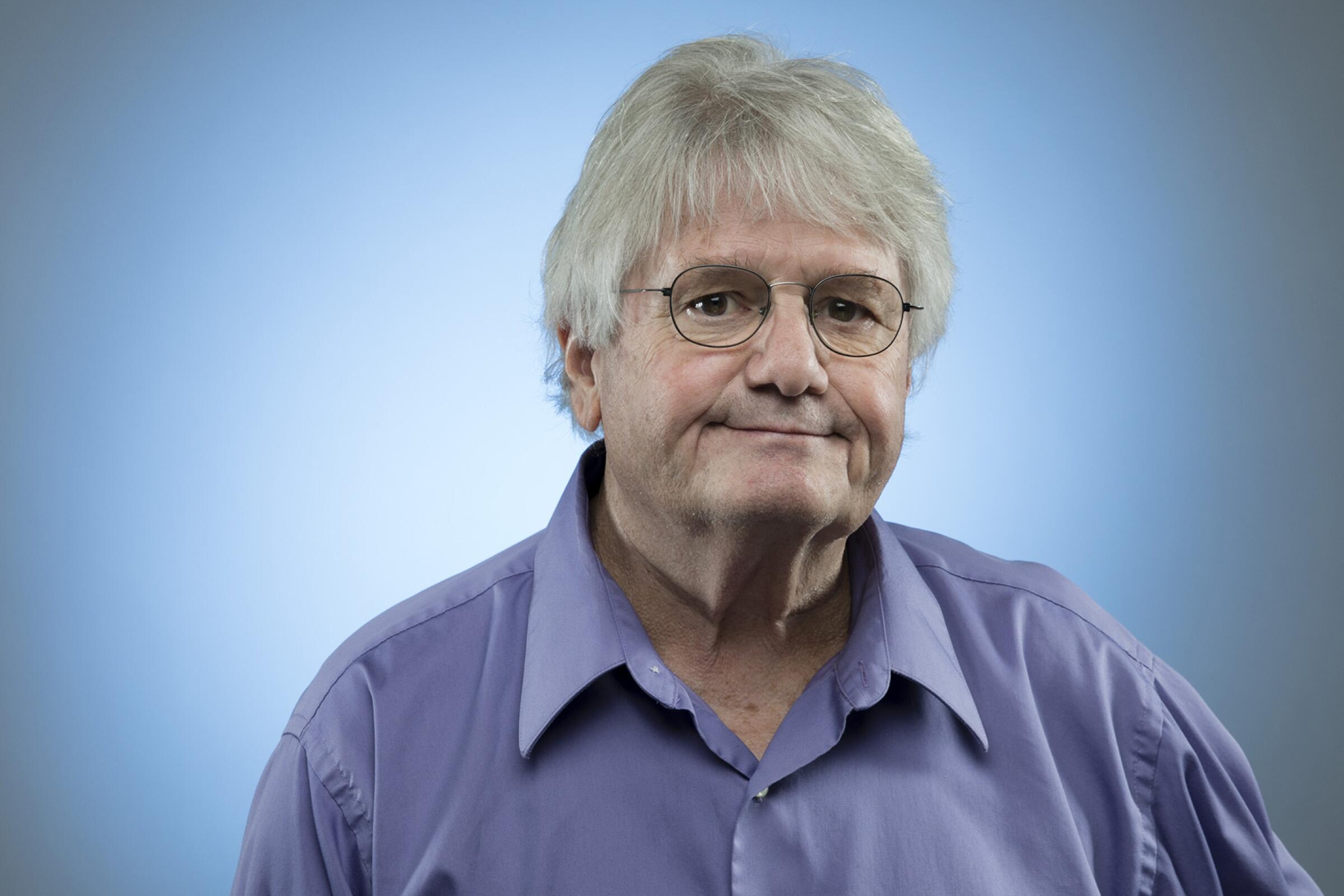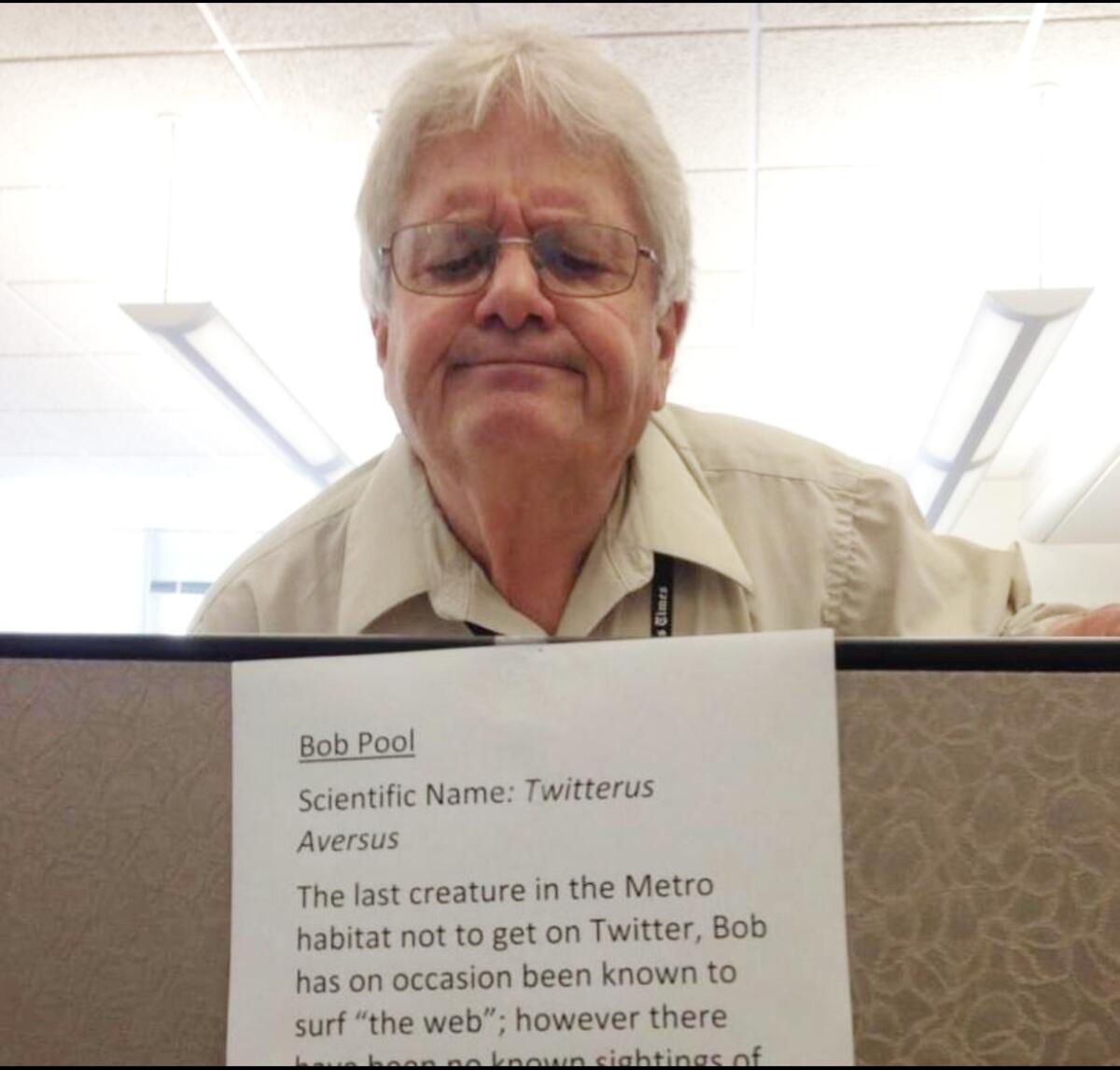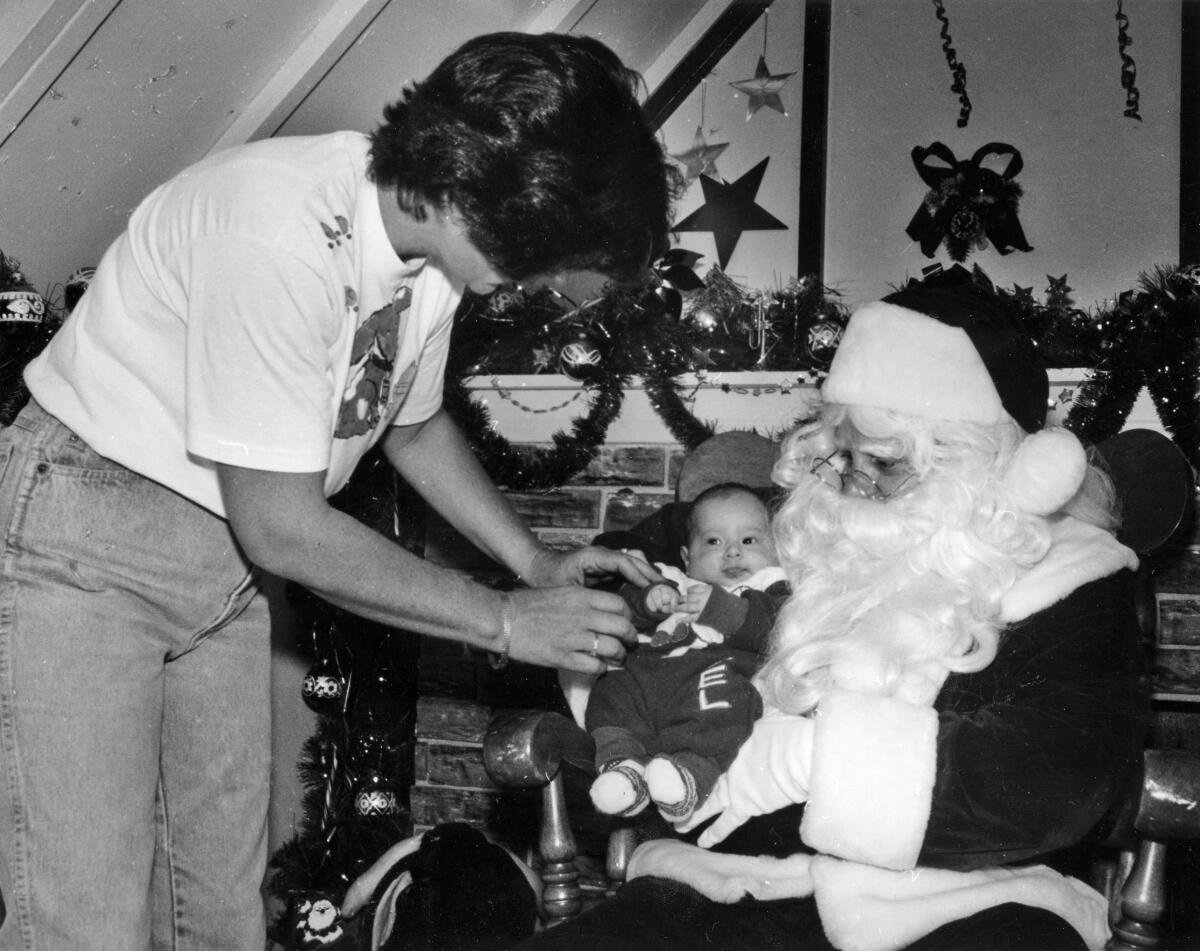Start your day right
Sign up for Essential California for the L.A. Times biggest news, features and recommendations in your inbox six days a week.
You may occasionally receive promotional content from the Los Angeles Times.

Bob Pool, a veteran Los Angeles Times reporter who memorably chronicled the triumphs, challenges and daily lives of everyday Angelenos, died Sunday, according to his family. He was 79.
Pool, who worked at the Times for more than three decades before retiring in 2014 and had been in failing health in recent years, was beloved by readers and colleagues for his empathy, humor and wit — and his ability to tell tales about Los Angeles that made the sprawling metropolis feel like a small town.
Pool was a Los Angeles Times legend. His beat was ‘the Bob Pool story,’ a perfect slice of the human condition that made reading the daily news bearable.
“He was a newspaper man to the core of his being and he just had a playful sense of curiosity and a delightfully droll sensibility often in his writing,” said Sherry Pool, his wife of 45 years who was by his side when he died at a long-term medical care facility. “I think that Bob knew Los Angeles, the whole county, certainly the city, as well if not better than most people because he … just loved getting the story.”
Born in Port Monmouth, N.J., Pool moved nine times before his father’s job as an electrical engineer finally landed the family in Canoga Park in 1957. His love of journalism began early. He was the youngest credentialed reporter to cover the Democratic National Convention in Los Angeles in 1960 when John F. Kennedy was nominated to be the party’s nominee. (Pool’s father had to drive the teen from the San Fernando Valley to downtown Los Angeles to cover the event for an Alabama newspaper based in his mother’s hometown.)
Pool was named the editor of the student newspapers at Canoga Park High School and San Fernando Valley State College (which eventually became Cal State Northridge.) After graduation, Pool was drafted into the Army in 1968 during the Vietnam War and stationed in Honolulu for nearly two years, where he met his future wife.
After Pool’s military service, he joined the Thousand Oaks News-Chronicle, where he worked as a reporter and photographer, and sometimes served as a page designer.
“He rarely passed up a tip. And he could make a story out of anything,” said Rick Collins, who met Pool at the News-Chronicle (now the Ventura County Star) around 1970 and preceded him joining The Times in the early 1980s before retiring from The Times’ page design desk in 2016.

Pool crisscrossed the Las Virgenes and Agoura Hills areas in a tan Volkswagen bug equipped with a police scanner, Collins recalled.
“He was just chasing stuff day and night. The funny things he would come up with,” said Collins, adding that on the small town’s daily newspaper, reporters were expected to write multiple stories each day, “you’re humping all the time. You have to fill pages.”
Collins recalled that Pool was once planning to buy camera equipment at the time at a local shop, and he asked him why he didn’t purchase at a discount chain store where it would be much less expensive.
“He said, ‘You know, when I was in high school, I couldn’t afford it. The owner of that store gave me credit and he let me pay off my cameras a little bit every month, and I never forgot that,’” Collins said, adding that Pool said he would never buy any gear elsewhere.
Pool joined the Times in 1983 as a general assignment reporter on the metro desk, covering a broad array of stories. But he was best known for human-interest pieces that focused on the lives of ordinary Californians — a pregnant postal worker, a Bel Air hotel bellhop — who didn’t attract the attention of reporters more fixated on the city’s celebrities and politicians.
“Bob wrote about people who would not have had a moment in the sun the way they did had they not crossed paths,” said Hector Becerra, the Times’ managing editor who met Pool when he was an unpaid intern in 1998. “He specialized in telling stories that would not have existed had it not been for Bob Pool.”

He also enjoyed immersing himself in the community, such as when he dressed up as Santa Claus for a couple of weeks in 1990, much to the chagrin of his wife. But Pool also had a serious side — reporting about the controversial Church Universal and Triumphant and the 1995 bombing of the Alfred P. Murrah Federal Building in Oklahoma City.
“He could do anything — breaking news, obviously features [and] investigations,” said Paul Pringle, a Times investigative reporter who met Pool at the Thousand Oaks newspaper in 1980. Pool was his oldest daughter’s godfather. “He had a great capacity for empathy and he was just a nice guy. He did have a hard interior — when it was appropriate, it would come out.”

Pringle added that Pool was able to quickly size up people and stories, and didn’t believe in meandering over articles — a trait proved by the more than 4,000 stories Pool wrote at The Times.
“He didn’t believe in sitting around and waiting for inspiration,” Pringle said. “He cranked it.”
Pool was also known in the newsroom for his unassuming demeanor, lack of ego, love of puns and idiosyncrasies, such as his difficulties dealing with technology. But he is most remembered for the interest he took in his colleagues, regardless of status, a reflection of how Pool approached his coverage of Los Angeles.
“You could be the greenest intern and he would treat you just as well as an executive,” Becerra said. “It just wasn’t in his nature to treat people based on some hierarchy.”
Pool is survived by his wife, twin children Brandon and Brittany, four siblings, three grandchildren and nearly two dozen nieces and nephews. Memorial services are pending.
Times staff writer Paul Pringle contributed to this report.
Start your day right
Sign up for Essential California for the L.A. Times biggest news, features and recommendations in your inbox six days a week.
You may occasionally receive promotional content from the Los Angeles Times.